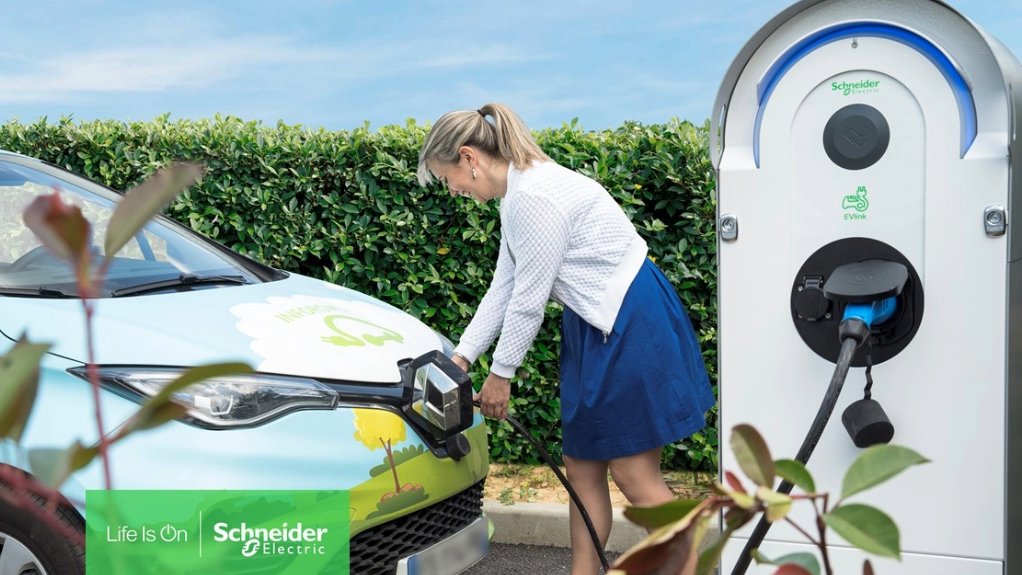
+27 (0)11 0461900
Private Bag X139 Halfway House 1685

Smart e-mobility solutions – going beyond EV charging to integration with building management and energy distribution systems
By Chris: Neethling - Channel Sales Manager and Tobi Olorunsola, Offer Manager Home & Distribution Division at Schneider Electric
While electric vehicles (EVs) are gaining traction in many international markets, uptake of this green form of transport is still lagging somewhat in South Africa, mainly due to the shortage of supporting infrastructure, such as charging stations, and the instability of the national power grid.
Even so, local demand for EVs is growing as more and more environmentally conscious motorists are seeking cleaner alternatives to internal combustion engines (ICE). According to research by Statista, the local EV market is anticipated to witness significant revenue growth, with projections indicating a figure of R606.7 million ($32.5 million) in 2024. This growth is expected to continue at an annual growth rate of 16.93% (CAGR 2024-2028), resulting in a projected market volume of R1.13 billion ($60.8 million) by 2028.
Aside from personal transport, demand for e-mobility solutions is also coming from business and commercial building owners, who want this infrastructure deployed in work and public environments.
Commercial settings
In commercial settings, smart e-mobility solutions enable business owners to launch electric mobility in their companies while keeping investment, utility costs and power supply fully optimised. This also improves customer experience and satisfies employees who drive EVs, while providing new revenue-generating opportunities.
Smart end-to-end e-mobility solutions go beyond EV charging infrastructure but provide an entire electric mobility ecosystem that is connected to provide a cost-efficient and convenient charging experience for homes, buildings and fleets. This minimises downtime and prioritises using renewable energy for a net-zero future.
The steady uptake of EVs in South Africa is also partly being enabled by an increasing number of homeowners who are switching to solar power, with grid electricity as a backup, to minimise their exposure to ongoing load shedding. This trend is seeing the incorporation of smart chargers into the power systems of buildings and homes.
Smart e-mobility solutions are designed to enable EV charging from solar power sources – whether in residential or commercial applications – and do not utilise the power grid. These systems can be set up to use the electrical grid as a backup when solar power is not available and can be automated and controlled remotely. Smart charging stations also provide layers of intelligence such as distributed energy resource management systems that provide the ability to monitor various energy resources.
Powerful and overarching architecture
Schneider Electric's offering, called eMobility, is a powerful and overarching architecture that goes beyond EV charging and can be integrated into building management and energy distribution systems.
Schneider Electric’s eMobility solutions are designed for the following applications:
·EVLink Home, which caters for individual EV owners who are looking for a smart charging solution that can be installed at their residential premises. These chargers are designed for slow charging, with an alternating current (AC) range of up to 11kW.
·EVlink Pro AC, which is a reliable, sustainable, and connected charger that is fast to install, easy to operate and maintain, as well as ideal for minimising costs and downtime. This is a faster charging solution with higher capacity (AC range of up to 22 kW).
·EVLink Pro DC, which is a fast charger with a direct current (DC) range of up to 180kW. This offering will be suitable for use in transit, such as at charging stations, and can provide a full charge in a short time.
All of Schneider Electric’s eMobility solutions seamlessly integrate with a charging load management system that helps EV owners to efficiently control their EV infrastructure and smartly distribute available power to their charging stations.
While an unstable electricity supply and a lack of supporting infrastructure mean that EV adoption is still in the early stages in South Africa, this market is likely to mature in the coming years. The sales of EVs will no doubt be aided by the rollout of smart e-mobility solutions.




